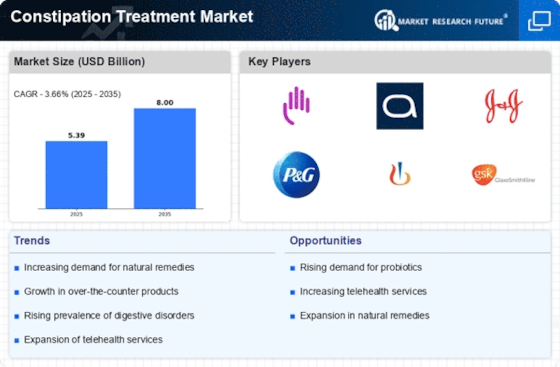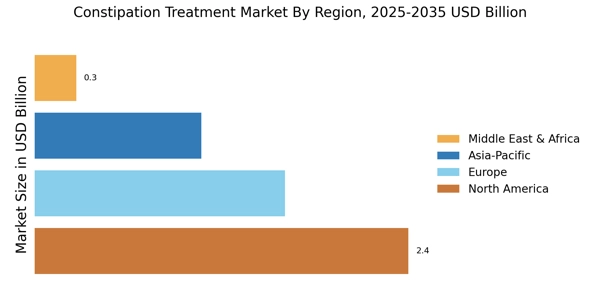Growing Awareness of Digestive Health
There is a notable increase in public awareness regarding digestive health, which significantly influences the Constipation Treatment Market. Educational campaigns and health initiatives have emphasized the importance of maintaining a healthy digestive system. As a result, consumers are becoming more proactive in seeking treatments for constipation and related disorders. Market data suggests that the demand for over-the-counter laxatives and dietary supplements has surged, reflecting this heightened awareness. Furthermore, healthcare professionals are increasingly recommending lifestyle changes, such as improved diet and hydration, alongside pharmacological treatments. This trend indicates a shift towards a more holistic approach to managing constipation, which may lead to a diversification of products available in the market. The growing focus on digestive health is expected to sustain the momentum of the Constipation Treatment Market.
Increasing Prevalence of Constipation
The rising incidence of constipation is a primary driver for the Constipation Treatment Market. Studies indicate that approximately 20% of the population experiences constipation at some point in their lives. This condition is particularly prevalent among older adults, with estimates suggesting that nearly 30 to 40% of elderly individuals suffer from chronic constipation. As awareness of gastrointestinal health grows, more individuals are seeking effective treatments, thereby expanding the market. The increasing prevalence of sedentary lifestyles and poor dietary habits further exacerbates this issue, leading to a heightened demand for various treatment options. Consequently, pharmaceutical companies and healthcare providers are focusing on developing innovative solutions to address this growing concern, which is likely to propel the Constipation Treatment Market forward.
Advancements in Pharmaceutical Research
Innovations in pharmaceutical research are driving the evolution of the Constipation Treatment Market. Recent developments in drug formulations and delivery systems have led to the introduction of more effective and targeted treatments. For instance, new classes of medications, such as guanylate cyclase-C agonists, have shown promising results in clinical trials, offering patients improved relief from constipation. Additionally, the integration of technology in drug development processes has accelerated the pace of bringing new treatments to market. Market analysts project that the introduction of novel therapies will not only enhance patient outcomes but also expand the treatment options available, thereby stimulating growth in the Constipation Treatment Market. As research continues to evolve, the potential for breakthrough treatments remains high, which could reshape the landscape of constipation management.
Rising Demand for Natural and Herbal Remedies
The increasing consumer preference for natural and herbal remedies is reshaping the Constipation Treatment Market. Many individuals are seeking alternatives to conventional medications due to concerns about side effects and long-term use. This trend has led to a surge in the popularity of natural laxatives, such as psyllium husk and senna, which are perceived as safer options. Market data indicates that sales of herbal supplements for digestive health have experienced significant growth, reflecting this shift in consumer behavior. Furthermore, manufacturers are responding to this demand by developing new products that combine traditional herbal ingredients with modern formulations. This growing inclination towards natural treatments is likely to continue influencing the Constipation Treatment Market, as consumers increasingly prioritize holistic health solutions.
Aging Population and Increased Healthcare Expenditure
The aging population is a critical factor driving the Constipation Treatment Market. As individuals age, they often experience a decline in gastrointestinal function, leading to higher rates of constipation. This demographic shift is accompanied by increased healthcare expenditure, as older adults typically require more medical attention and treatment options. Data suggests that healthcare spending on digestive disorders, including constipation, is on the rise, reflecting the need for effective management strategies. Additionally, healthcare providers are focusing on tailored treatment plans for elderly patients, which may include a combination of lifestyle modifications and pharmacological interventions. This trend indicates a growing market for constipation treatments specifically designed for older adults, thereby enhancing the overall growth potential of the Constipation Treatment Market.

















